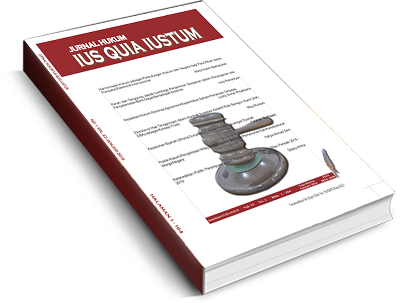Main Article Content
Abstract
Keywords
Article Details
Authors who publish with this journal agree to the following terms:
a. Authors retain copyright and grant the journal right of first publication with the work simultaneously licensed under a Creative Commons Attribution License that allows others to share the work with an acknowledgement of the work's authorship and initial publication in this journal.
b. Authors are able to enter into separate, additional contractual arrangements for the non-exclusive distribution of the journal's published version of the work (e.g., post it to an institutional repository or publish it in a book), with an acknowledgement of its initial publication in this journal.
References
- Daftar Pustaka
- Asshiddiqie, Jimly, “Hukum Islam di Antara Agenda Hukum Nasional,†Mimbar Hukum FH UGM Yogyakarta No. 51 Thn. XII 2001.
- Ali, Achmad, “Eksistensi Hakim dalam Menegakkan Hukum di Indonesia,†dalam Mimbar Hukum FH UGM Yogyakarta No. 52 Thn. XII 2001.
- Azizy, A. Qodri, “Hukum Islam sebagai Sumber Hukum Positif dalam Reformasi Hukum Nasional,†dalam Mimbar Hukum FH UGM Yogyakarta No. 54 thn. XII 2001.
- Effendi M. Zein, Satria, “Analisis Fiqh,†dalam Mimbar Hukum FH UGM Yogyakarta No. 30 Thn. VIII 1997.
- _____, “Munawir Sjadzali dan Reaktulisasi Hukum Islam di Indonesia,†ed. Muhammad Wahyuni Nafis dalam Kontekstualisasi Ajaran Islam, 70 Tahun Munawir Sadzali, Cet. 1, PT. Temprint, Jakartta, 1995.
- Hanityo, Ronny, Metode Penelitian Hukum, Cet. 1, Ghalia Indonesia, Jakarta, 1982.
- Jaya Bakti, Asfari, Konsep Maqashid al-Syari’ah menurut Al-Syatibi dan Relevansinya dengan Ijtihad Hukum Dewasa Ini, Program Pascasarjana IAIN Syarif Hidayatullah, Jakarta, 1994.
- Manan, Bagir, “Peranan Peradilan Agama dalam Pembinaan Hukum Nasional,†di dalam Yuhaya S. Praja, Hukum Islam Indonesia: Pemikiran dan Praktek, Cet. 1, Remaja Rosdakarya, Bandung, 1991.
- Mualim, Amir, dan Yusdani, Konfigurasi Pemikiran Hukum Islam, Cet. 2, UII Press, Yogyakarta, 2001.
- Saleh, Ismail, “Wawasan Pembangunan Hukum Nasional,â€Makalah dalam Dialog tentang Pembangunan Hukum Nasional, Memperingati 8 Windu Pondok Modern Gontor Indonesia, 17 Juni 1991
- GBHN Tahun 1999
- Hasil Wawancara dengan Rozikhan, Ulama Muhammadiyah, Wakil Ketua PW Jawa Tengan, pada tanggal 2 Januari 2010.
- Putusan Pengadilan Agama Mataram: No. 85/Pdt.G/92/V/PA.MTR, tanggal 5 Nopember 1992 M, bertepatan tanggal 10 Jumadil Awal 1413 H., Jo. Putusan Pengadilan Tinggi Agama Mataram: No. 19/Pdt.G/1993/PTA. MTR, tanggal 15 September 1993 M, bertepatan tanggal 28 Rabiul Awal 1414 H., Jo. Putusan Mahkamah Agung RI: No. 86 K/AG/194, tanggal 28 April 1995.
References
Daftar Pustaka
Asshiddiqie, Jimly, “Hukum Islam di Antara Agenda Hukum Nasional,†Mimbar Hukum FH UGM Yogyakarta No. 51 Thn. XII 2001.
Ali, Achmad, “Eksistensi Hakim dalam Menegakkan Hukum di Indonesia,†dalam Mimbar Hukum FH UGM Yogyakarta No. 52 Thn. XII 2001.
Azizy, A. Qodri, “Hukum Islam sebagai Sumber Hukum Positif dalam Reformasi Hukum Nasional,†dalam Mimbar Hukum FH UGM Yogyakarta No. 54 thn. XII 2001.
Effendi M. Zein, Satria, “Analisis Fiqh,†dalam Mimbar Hukum FH UGM Yogyakarta No. 30 Thn. VIII 1997.
_____, “Munawir Sjadzali dan Reaktulisasi Hukum Islam di Indonesia,†ed. Muhammad Wahyuni Nafis dalam Kontekstualisasi Ajaran Islam, 70 Tahun Munawir Sadzali, Cet. 1, PT. Temprint, Jakartta, 1995.
Hanityo, Ronny, Metode Penelitian Hukum, Cet. 1, Ghalia Indonesia, Jakarta, 1982.
Jaya Bakti, Asfari, Konsep Maqashid al-Syari’ah menurut Al-Syatibi dan Relevansinya dengan Ijtihad Hukum Dewasa Ini, Program Pascasarjana IAIN Syarif Hidayatullah, Jakarta, 1994.
Manan, Bagir, “Peranan Peradilan Agama dalam Pembinaan Hukum Nasional,†di dalam Yuhaya S. Praja, Hukum Islam Indonesia: Pemikiran dan Praktek, Cet. 1, Remaja Rosdakarya, Bandung, 1991.
Mualim, Amir, dan Yusdani, Konfigurasi Pemikiran Hukum Islam, Cet. 2, UII Press, Yogyakarta, 2001.
Saleh, Ismail, “Wawasan Pembangunan Hukum Nasional,â€Makalah dalam Dialog tentang Pembangunan Hukum Nasional, Memperingati 8 Windu Pondok Modern Gontor Indonesia, 17 Juni 1991
GBHN Tahun 1999
Hasil Wawancara dengan Rozikhan, Ulama Muhammadiyah, Wakil Ketua PW Jawa Tengan, pada tanggal 2 Januari 2010.
Putusan Pengadilan Agama Mataram: No. 85/Pdt.G/92/V/PA.MTR, tanggal 5 Nopember 1992 M, bertepatan tanggal 10 Jumadil Awal 1413 H., Jo. Putusan Pengadilan Tinggi Agama Mataram: No. 19/Pdt.G/1993/PTA. MTR, tanggal 15 September 1993 M, bertepatan tanggal 28 Rabiul Awal 1414 H., Jo. Putusan Mahkamah Agung RI: No. 86 K/AG/194, tanggal 28 April 1995.
